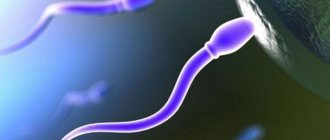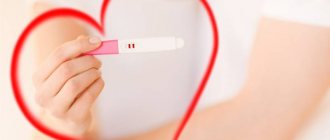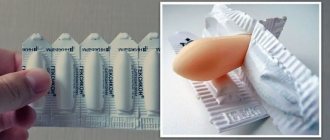The main sign that indicates the presence of an inflammatory or infectious process in the female reproductive organs is the itching that appears after menstruation. This phenomenon often worries women; it is often the main sign of pathological changes, however, less often it happens that this phenomenon is not associated with a disease.
Specific causes of itching
A common cause of itching after menstruation is visiting the pool. After swimming, a woman needs to wash off the chlorine from the mucous membrane of her external organs as quickly as possible. Another reason that can provoke the appearance of vaginal itching is a violation of the natural microflora. This condition can be caused by uncontrolled use of medications, most often antibacterial, and frequent douching.
Endometriosis
Endometriosis most often occurs in the pelvis, ovaries and uterus. In rare cases, the cells migrate to other organs such as the intestines and bladder. Sometimes such endometriomas are also found in the lungs, heart and even in the eye.
The cells of the mucous membrane are hormone-dependent and undergo the same cyclical changes as the lining of the uterus. The disease is characterized by severe pain and discomfort. In other cases, endometriosis leads to infertility.
Symptoms of endometriosis vary, making diagnosis difficult. Typical and common complaints about endometriosis:
- Pain in the lower abdomen, often starting a few days before menstruation. The pain may intensify and be accompanied by nausea and vomiting.
- Dyspareunia.
- Circulatory disorder.
- Pain in the abdomen outside of menstruation.
- Rapid fatigue, diarrhea, feeling of fullness and general malaise.
- Brown discharge appears after menstruation and breast pain.
After complex therapy, brown discharge without odor and pain after menstruation will disappear. There are three main ways to treat endometriosis. This is restoration of the cycle with the help of hormones, symptomatic treatment of pain and cramps, surgery.
Pathological causes of itching
Sometimes the reason that a woman experiences itching after menstruation is certain diseases. Such a symptom may warn of the development of the following pathologies:
- urogenital candidiasis;
- inflammatory process in the appendages;
- papillomavirus infection;
- diabetes;
- trichomoniasis;
- ureaplasmosis;
- nonspecific vaginitis.
Let's look at the most common causes of itching after menstruation.
Urogenital candidiasis is popularly called “thrush”. The main predisposing factor for such an unpleasant condition is a decrease in immunity, against the background of which yeast-like fungi are activated. Symptoms can also occur in those who love sweets, since these pathogens prefer to multiply in the body, which receives a large amount of carbohydrates.
What does white discharge and itching mean after menstruation?
With candidiasis, signs such as curdled discharge from the genital tract, itching, sensitivity and burning in the genital area may appear. Symptoms do not always appear immediately after menstruation ends. These phenomena are often present during menstruation.
Nonspecific vaginitis or colpitis is an inflammatory process in the genitals of a bacterial nature. The main provocateur in this case is also reduced immunity, against the background of which opportunistic flora begins to develop intensively. In addition, the disease can occur due to insufficient hygiene or infection entering the body during sexual intercourse. This pathology is characterized by purulent or mucous discharge from the vagina. The genitals itch, become inflamed and swell.
Some people are also concerned about an unpleasant odor in the intimate area.
With trichomoniasis, a yellow discharge appears, which is often accompanied by a pungent odor and severe itching. In addition, the urination process is associated with intense painful sensations that are observed with cystitis. Pustules appear on the outside of the genitals, which begin to bleed even after minor irritation.
Why does your intimate area itch and itch after your period?
Any changes in the normal functioning of a woman’s body in one way or another affect the nature of the menstrual cycle.
There are pathologies that shorten its duration or change the natural process of menstrual flow, but there are internal and external factors that cause discomfort in the intimate area after menstruation.
Regular itching after menstruation can be caused by everyday reasons, then you can get rid of it yourself, but most often the cause lies in an infection of the genital organs, in which case you simply cannot do without medical help.
Main factors of itching
It turns out that after menstruation, many women experience itching in the intimate area. For some, it may begin from the very first day of discharge; in this case, poor hygiene is the No. 1 irritating factor.
For other representatives of the fair sex, itching in the vagina occurs already at the end of menstruation; the causes that cause it can be both domestic and pathological.
According to experts, this could be:
- insufficient or excessive hygiene of the intimate area;
- development of allergic reactions to sanitary pads, household chemicals (soap, shower gel);
- medications whose instructions state that itching that occurs regularly after menstruation is a side effect;
- problems with weight (excess or significant lack);
- improper use of depilatory products;
- low immunity.
There are also specific everyday reasons that cause discomfort in the intimate area, for example, poor rinsing of chlorinated water from the body after regular use of the pool. Disruption of the microflora in the vagina due to frequent douching and uncontrolled use of medications, especially antibiotics, will lead to the same consequences.
Synthetic fibers that make up the fabrics from which underwear is made can also cause discomfort in the intimate area. If itching occurs after sexual intercourse, it could be caused by an allergy to sperm or to a contraceptive.
Pathologies
The reason for regular discomfort after menstruation in women does not always lie in everyday factors; in some cases, serious illnesses occur. We list the main pathologies with symptoms of characteristic itching after menstruation:
- urogenital candidiasis;
- inflammation of the appendages;
- human papillomavirus;
- diabetes;
- trichomoniasis;
- nonspecific vaginitis.
If a burning sensation in the vagina occurs due to urogenital candidiasis, which is popularly called “thrush,” it means that the woman most likely has a reduced immune system, against the background of which Candida fungi have become more active.
The same symptoms appear in women with a sweet tooth, since this type of fungus “loves” carbohydrates.
Additional signs of candidiasis: curdled discharge, burning and itching sensations in the genital area, which occur immediately after menstruation and even during them.
Nonspecific vaginitis is called inflammation of a bacterial nature, the main provoking factor of which is the growth of opportunistic flora against the background of reduced immunity or insufficient hygiene. With this disease, the genitals may become swollen and very itchy, as well as mucous and purulent discharge from the vagina.
With trichomoniasis, in addition to the itching of the intimate area, yellowish discharge with a pungent odor appears, and urination is accompanied by painful sensations, as with cystitis. With this pathology, pustules may appear on the labia, bleeding from the slightest irritation.
It is very rare, but itching in the intimate area can be a sign of a pathology of the nervous system or a mental disorder; only an experienced specialist can finally identify the cause of this condition.
Consequences
A woman’s lack of response to such uncomfortable symptoms can not only worsen the quality of life, but also lead to irreparable consequences. Itching caused by infectious processes in the body is especially dangerous; if they are not treated on time, this can lead to the formation of adhesions in the uterus and its appendages.
Due to the adhesive process, without proper medical assistance, over time, the fallopian tubes can become completely obstructed, and this complicates the onset of pregnancy and contributes to its ectopic course.
Due to abdominal adhesions, problems with the development of the fetus may arise, which quite often ends in its freezing, that is, the cessation of its development.
Diagnostics
Even if the itching began during menstruation, a full diagnosis can be carried out only after the discharge has stopped. To determine the cause of discomfort in the intimate area, the doctor may prescribe the following tests:
- examination by a gynecologist and therapist. Initially, the general condition of the patient, the appearance of her genitals and vaginal discharge are assessed;
- examination of the internal genital organs by palpation;
- laboratory tests of vaginal smears, general blood and urine tests. These tests help identify the inflammatory process and assess its stage;
- Ultrasound of the pelvic and abdominal organs;
- colposcopy, a visual examination of the cervix with high magnification is performed.
Only after all the above measures have been carried out and a diagnosis has been made, the doctor decides on the method of treating the patient and how to eliminate itching sensations.
Treatment
The treatment method used to eliminate itching will depend on the diagnosis given to the patient after all examinations:
- for colpitis, the use of anti-inflammatory drugs is prescribed with mandatory douching with disinfectant solutions such as chlorhexidine. Hormonal and antibacterial therapy may include drugs such as Ofor, Terzhinan or Metronidazole;
- thrush is treated with antifungal drugs, which in the vast majority are designed to boost a woman’s immunity. To eliminate burning and itching, local medications are used in the form of ointments, creams and suppositories;
- Trichomoniasis is treated with Metronidazole, and local therapy is considered useless by specialists. For this pathology, only oral medications are used;
- herpes is treated with antiviral drugs;
- for adnexitis or endometritis, it is necessary to use complex therapy, including not only analgesics, antibiotics and vitamins, but also physiotherapeutic measures.
Only a specialist can prescribe adequate treatment for any of the pathologies listed above. Self-treatment can worsen the patient’s health or remove only the symptoms of the disease, leaving the root cause, which will certainly lead to a relapse of the disease in the future.
When undergoing a treatment course, you need to maintain sexual rest, adhere to a dietary diet, if the vagina is excessively dry, use natural lubricants and regularly perform hygiene procedures.
Prevention
Every woman who experiences itching in the intimate area does not want to feel it again, so it is very important to know and put into practice the basic preventive measures that will help prevent the occurrence of such symptoms:
- you need to control the menstrual cycle;
- maintain intimate hygiene;
- do not engage in unprotected intimate relationships;
- carry out hygienic washing after each visit to the toilet;
- use special soap or gel for intimate hygiene;
- change sanitary pads every 2 hours;
- eat less fatty, spicy and sweet foods during menstrual periods;
- Do not visit the pool or sauna during menstruation.
If any uncomfortable symptoms occur in the urogenital area, you should immediately seek help from a doctor; the health of not only the woman, but also her future offspring may depend on this.
Source: https://TvoiMesyachnye.ru/obshhie-svedeniya/cheshetsya-posle-mesyachnyh
Improper hygiene
Improper hygiene also causes itching. Against this background, opportunistic microbes and fungi spread. A specific picture is characterized by such a pathology as diabetes mellitus, which creates the prerequisites for the development of fungi, causing the mucous membranes of the genital organs to itch and swell very much. Candidiasis in diabetes is quite common.
Popular questions
Oksana, hello! For six months now I have had dry vulva, white thick discharge, like kefir, with a bitter or sour odor, and lack of lubrication during sex. It seems like all the symptoms of thrush, but my smears are clean. I rented it out several times. The mucous membrane became very sensitive in the morning. Even if you lubricate it with Ginocomfort gel, the entire surface burns. It's like it was scratched there. From March to January I took the COC Yarina+, but then stopped because... I thought it was a side effect. Please tell me how can I find out the cause of this condition?
Hello! You need to conduct a more expanded set of examinations: PCR for STIs (for example, femoflor screening), culture for nonspecific microflora, smear analysis for oncocytology. The results will help not only assess the balance of microflora, but also the degree of hormonal saturation, which is also important in ensuring hydration and elasticity of the mucous membranes.
What is the danger?
Regular itching after menstruation can pose some danger to women's health, especially if it is caused by diseases. In this case, inflammation can spread from the external to the internal reproductive organs of a woman, which over time leads to the formation of adhesions in the area of the appendages, which, in turn, causes obstruction of the fallopian tubes and infertility. In this case, conception becomes a big question mark, and the likelihood of an ectopic pregnancy increases sharply.
Ectopic pregnancy
In an ectopic pregnancy, the fertilized egg does not implant inside the reproductive organ; it attaches outside the uterine cavity in the fallopian tube.
By the end of the 19th century, ectopic pregnancy had become the leading cause of death among young women. Thanks to medical advances and improved surgical techniques (minimally invasive surgery), the mortality rate has dropped significantly to less than 0.01%. The number of ectopic pregnancies has increased in recent years. The reason for this is the increase in the number of artificial inseminations, in which the risk of such a pathology is always high.
Symptoms:
- The test is positive.
- Between 6 and 9 weeks of pregnancy, light to heavy bleeding occurs.
- Abdominal pain is usually unilateral and occurs on the affected side of the fallopian tube.
- The lower abdomen is very sensitive to touch.
- Brown discharge and pain in the lower abdomen after menstruation (which should have come, but did not) is also no exception.
The diagnosis is made by a gynecologist using ultrasound or a blood test for hCG. Treatment of ectopic pregnancy is surgery. Unfortunately, the purpose of the operation is to remove the fetuses.
Drug therapy is possible if the ectopic pregnancy does not cause discomfort. Otherwise, this treatment may also be accompanied by surgery if the entire fetus cannot be removed with placental tissue. The cytotoxin Methotrexate (MTX) is used, which prevents the pregnancy from growing further. It is usually given as an infusion through a vein or injected into a muscle.
Establishing diagnosis
It is recommended to go to the doctor if itching occurs after menstruation on the seventh to tenth day of the cycle. The specialist in the diagnostic process acts as follows:
- assesses the state of genital secretions;
- palpates the appendages and uterus;
- refers the woman for testing to determine the presence of STDs;
- performs colposcopy;
- refers the patient for an ultrasound examination.
Let's consider what the treatment of itching after menstruation is.
Dryness of the female genital organs, video
is not responsible for the accuracy of the information presented in this video clip. Source – vrach85
- NEW OPPORTUNITIES IN THE THERAPY OF VULVA AND VAGINA PATHOLOGY. Ignatovsky A.V., Sokolovsky E.V. // Journal of obstetrics and women's diseases. – 2009. – No. 1. – pp. 56-59.
- PROBLEMS OF UROGENITAL DYSTROPHY IN WOMEN OF REPRODUCTIVE AND PERIMENOPAUSAL AGE. Karahalis L. Yu // Kuban Scientific Medical Bulletin. – 2007. – P. 63-68.
- THERAPY OF UROGENITAL DISORDERS CAUSED BY ESTROGEN DEFICIENCY. Serov V.N. // Obstetrics, gynecology and reproduction. – 2010. – No. 1. – P. 21-35.
Bacterial vaginosis (clinic, diagnosis, treatment). Kira E. F. // Author's abstract. dis. Dr. med. Sci. - St. Petersburg, 1995. - P. 44.
Urogenital infections in women. Kisina V.I., Zabirov K.I. // M.: MIA,. - 2005. - P. 12.
Terminology and classification of bacterial infectious diseases of the female genital organs. Kira E.F., Tsvelev Yu.V. // Vestn. Ross. Association of Obstetricians and Gynecologists. - 1998. - No. 2. — P.24–26.
Therapy methods
If the cause of this kind of discomfort is colpitis, the patient is prescribed anti-inflammatory medications. In addition, the doctor prescribes some disinfectant medications. If necessary, it may be recommended to take medications such as Metronidazole, Terzhinan, Ofora, Tiflox. For douching and washing, a chlorhexidine solution is usually prescribed. These products will also help remove unpleasant odor in the intimate area.
If thrush is the cause of the itching, the woman is prescribed antifungal medications. To normalize the state of the immune system, the use of the drug “Immunal” or echinacea tincture is prescribed. A variety of vaginal suppositories are of great benefit.
For trichomoniasis, the patient is prescribed the use of medications “Metronidazole” and “Trichopol”.
If the itching was caused by a virus, the specialist decides to prescribe medications similar to drugs such as Zovirax and Acyclovir. The use of these medications is often combined with the use of local remedies.
For endometritis and adnexitis, complex therapy is practiced, in which the patient is prescribed vitamin, analgesic and antibiotic medications. Drug treatment is usually combined with physical therapy.
When endocrine diseases are the trigger for itching after menstruation, the doctor prescribes therapy for the underlying pathological condition, which uses medications to relieve local symptoms.
How to get rid of discomfort
Unpleasant sensations can be eliminated when the cause of their occurrence is identified. External irritants can be removed by following simple rules:
- To prevent the appearance of harmful microflora - this requires regular washing.
- Change the brand of pads and tampons you use.
- Wear cotton underwear.
- Avoid using soap and other products that can cause irritation.
Itching caused by more serious causes disappears after treatment of the corresponding disease. In case of an infectious disease, antifungal and other drugs are prescribed that are designed to destroy pathogens. For certain diseases, physical therapy and other measures may be carried out. If a woman has erosion, it is cauterized. For other internal diseases, appropriate treatment is prescribed.
Regardless of the reasons why itching and burning appear, you should not ignore unpleasant symptoms, as they can lead to negative consequences. It is better to go to the doctor immediately - he will help solve the problem.
Prevention
A woman should pay special attention to preventive measures. First of all, it is necessary to control the menstrual cycle, carefully observe the hygiene of intimate areas, and not engage in unprotected sexual intercourse.
It is recommended to wash yourself after each toilet, and it is advisable to use special soap.
Sanitary pads (both daily and menstrual pads) should be changed once every 2 hours. It is also recommended to adhere to a diet that excludes the consumption of salty, fatty, sweet and spicy foods during menstruation. It is recommended to avoid visiting swimming pools and saunas for a while.
Treatment options
Only a gynecologist can determine and prescribe the correct treatment after examining and determining the causes of vaginitis. Among the necessary procedures, a woman will have to undergo a gynecological examination, during which the doctor will take a Pap smear (to exclude cancer) and prescribe a general (clinical) blood test to avoid the possible development of urinary tract infections.
General measures aimed at eliminating pathology such as vaginal dermatitis include the following:










